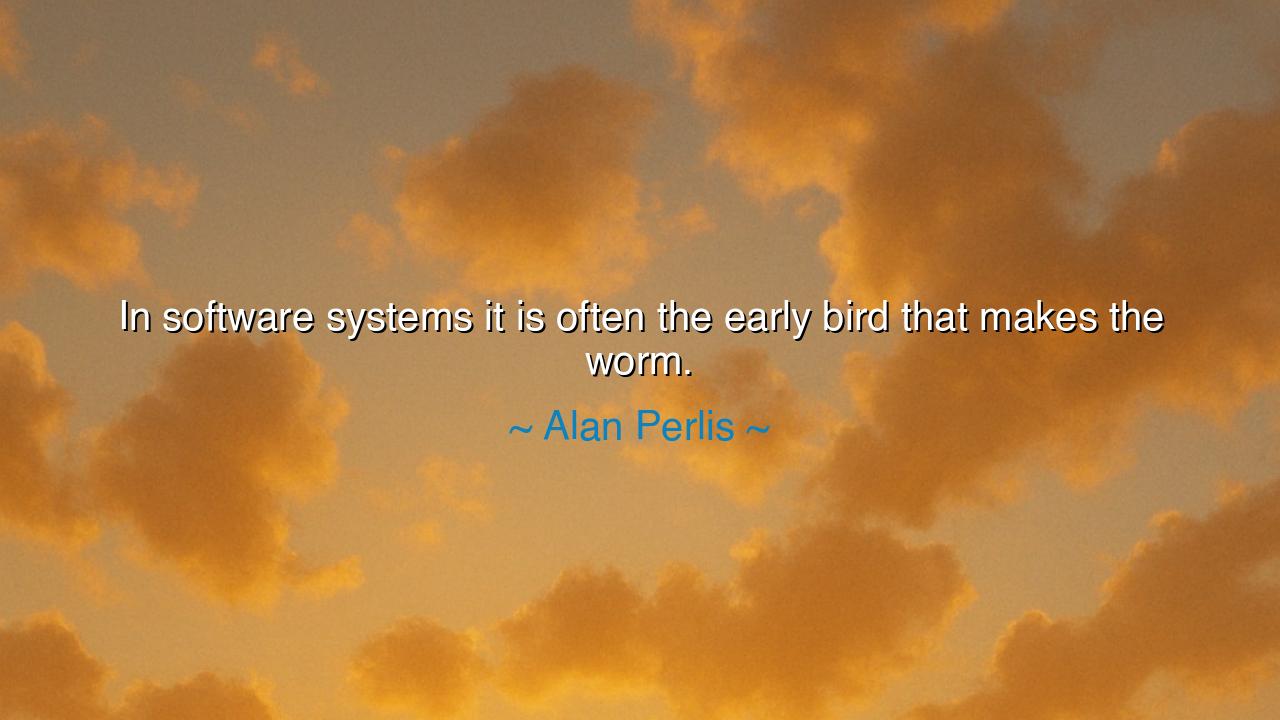
In software systems it is often the early bird that makes the






When Alan Perlis, sage of programming and first recipient of the Turing Award, declared, “In software systems it is often the early bird that makes the worm,” he spoke not with jest alone, but with a paradox filled with wisdom. In twisting the familiar proverb, he revealed a truth of creation: that in the realm of software, it is not always the one who seizes opportunity, but the one who creates the opportunity itself, who becomes master. The bird does not merely catch the worm—it invents the worm.
The ancients might have called this the power of naming, for in naming a thing, one brings it into existence. So too in the world of code: the first builder, the first architect of a system, defines the rules, the patterns, the constraints in which others must labor. The early bird is not simply quick; it is the originator. Its vision shapes the paths that millions will later tread. Thus Perlis speaks of responsibility as much as triumph, for to “make the worm” is to create the very reality others inherit.
We see this truth in the chronicles of technology. Consider the story of Tim Berners-Lee, who birthed the World Wide Web. Before him, the Internet was a vast wilderness of disconnected protocols and scattered pathways. He created the worm—hypertext links, URLs, and browsers—and the rest of the world soon lived within his vision. Others became birds feeding upon what he had first imagined. In his humble invention lay the foundations of a global society. The lesson: the first mover in software systems does not merely win; he defines the very game.
But Perlis also spoke with irony, warning against blind haste. For sometimes the early bird that makes the worm also shapes a flawed design, and generations of programmers suffer within its errors. Think of the QWERTY keyboard: an invention born of mechanical typewriter limitations, yet still binding us centuries later, long after its necessity has vanished. The worm, once made, is difficult to unmake. Thus the wisdom here is double-edged: the power of the early is mighty, but so too is the burden it carries.
This is why Perlis’s words burn with both humor and gravity. They remind us that in software systems, the first solutions often dictate the path of countless successors. The structure of programming languages, the design of operating systems, the standards of networks—these are the worms from which entire ecosystems of life emerge. To create early is to wield disproportionate influence, whether for the good of all or for the entanglement of many.
O seekers of truth, hear this teaching: do not wait passively for opportunity to come, nor assume that success is found merely in speed. Strive instead to be the one who creates the worm, the one whose work gives shape to the future. If you would leave a mark upon the world, invent the foundation upon which others will build. But temper this power with wisdom, for careless invention can chain as much as it can free.
Therefore, let Perlis’s proverb guide you: “In software systems it is often the early bird that makes the worm.” Be bold to act first, not merely to capture but to create. Yet be mindful that your creations will echo through time, for others will inherit them as their world. The practical path is this: when you build, build with foresight; when you design, design with responsibility; when you invent, invent not only for yourself, but for all who will follow. In doing so, you will not only seize the moment—you will give birth to futures.
Thus, in the age of code as in the age of stone, greatness belongs not to those who wait, but to those who dare to craft the very thing others will later need. Be the early bird. Make the worm. And let it be a worm that nourishes, not one that poisons, the generations yet to come.






AAdministratorAdministrator
Welcome, honored guests. Please leave a comment, we will respond soon